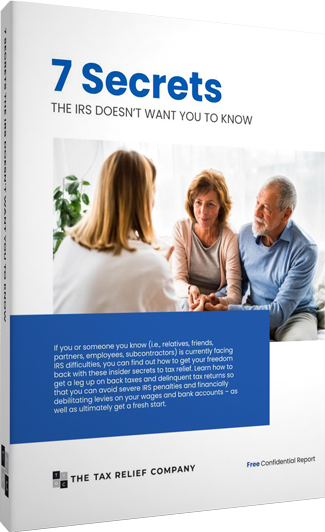I Received a Notice of Federal Tax Lien, What is it and What Do I Do?
What is it, and What Do I Do?
Not paying your taxes has serious consequences. One of the worst is the federal government filing a legal claim against all property you own and property acquired in the future in the form of a federal tax lien.
In this article, we’ll explain a federal tax lien and what you should do if you receive a certified letter saying you have one.
Note, we always recommend contacting a Certified Tax Resolution Specialist (CTRS) to negotiate with the IRS on your behalf.
What is a Federal Tax Lien?
A federal tax lien is a document filed with a county government (usually where the taxpayer lives or conducts business) notifying the general public that a taxpayer has an unpaid federal tax debt. There are two types. The IRS files this lien without notice when you owe $10,000 or more. Or a “silent lien.” If you ignore the collection notices, a certified letter called “Notice of Federal Tax Lien” will arrive.
Is This the Same Thing as a Tax Levy?
People often use the words “lien” and “levy” interchangeably, but they’re not the same. They are very different. A federal tax lien is the government’s legal claim/interest in all your property. They don’t sell it off or forcefully confiscate it, but it can make your life a lot harder having the IRS put a chain on everything you own.
A levy is the enforcement of the lien via an enforced collection of tax, for example, by confiscating money directly from a bank account or garnishing your net paycheck.
If you find out the IRS has served a tax levy, not a lien, on your employer, it is vital to contact a Certified Tax Resolution Specialist. They will begin immediate negotiations with the IRS before your next paycheck. Your bank and your employer will forward your money to the IRS. Neither the employer nor your bank is to blame for this; they must follow through. Only the IRS can stop a levy or garnishment. Once that happens, it is tough to get them back.
How a Lien Affects Your Assets.
A lien attaches to all of your assets (such as property, securities, and vehicles) and to future assets you acquire during the duration of the lien.
If a tax is assessed against you on July 1st and you give property to a third party as a gift on July 2nd, the tax lien continues to be attached to that property. This happens even if you had no prior knowledge of the existence of the tax lien. The person who received the property didn’t know that the tax lien had arisen.
The Notice of Federal Tax Lien may even be picked up by the various credit reporting agencies and may cause significant credit problems. However, since 2018, all three credit bureaus (Experian, Equifax, and TransUnion) have said they will remove many tax liens from consumer credit reports. The credit reporting agencies will now eliminate the last remaining tax lien data from consumer credit reports, which is about 5.5 million records [American Banker]. If any property is sold while you have a federal tax lien, the IRS will want to be paid before you get your cut.
What About My Business?
If the lien is for a business tax debt (i.e., payroll taxes), the lien attaches to all business property and all rights to business property, including accounts receivable. Now, this can put your business in jeopardy.
Can I File for Bankruptcy?
If you file for bankruptcy, your tax debt and Notice of Federal Tax Lien may survive and continue after the bankruptcy, as not all tax debts are dischargeable.
What’s My Next Step?
The IRS website says, “Paying your tax debt – in full – is the best way to get rid of a federal tax lien. The IRS releases your lien within 30 days after you have paid your tax debt.” However, most people can’t take out their checkbooks and fully pay the debt. That’s where a tax resolution specialist can help.
Many people believe entering into an installation agreement will remove a lien. That is false. The IRS will remove a lien or levy, even if the tax is not paid in full, only under specific circumstances.
Contrary to the IRS’s advice, your first course of action should be to call your Certified Tax Resolution Specialist. Dealing with the IRS yourself is like going to court without a lawyer. Sure, you could do it, but your chances of having a favorable outcome are slim.
A certified tax resolution expert can lay out a resolution plan, get on the phone with the IRS immediately on your behalf, and begin negotiations to relieve your tax problem.
Reach out to us, and we’ll schedule a no-obligation confidential consultation to explain your options to resolve your tax problem permanently if you owe over 10K. Of course, you can avoid a federal tax lien by simply filing and paying all your taxes in full and on time. However, if you can’t file or pay on time, don’t ignore the letters or correspondence you get from the IRS. If the IRS sends a tax notice, Jeffrey Schneider, EA, CTRS, is ready to help provide payment options available to help you settle your tax debt over time.
************************************************
Jeffrey Schneider, EA, CTRS, ACT-E, has the knowledge and expertise to help you reach a favorable outcome with the IRS. He is the head honcho at The Tax Relief Company, an Enrolled Agent, a Certified Tax Resolution Specialist, and Advanced Crypto Tax Expert.
************************************************
Author of the Now What? Help! Series. Jeff defines and deconstructs the scary and confusing letters in a fashion that mixes attention to detail with humor and a detailed clarification of what is what in the world of the IRS.
The books are available in paperback and eBook on Amazon.
************************************************
For more on The Tax Relief Company, visit The Tax Relief Company.
************************************************
738 Colorado Avenue Stuart, FL 34994
************************************************
Phone: 877-355-8010
************************************************
https://www.facebook.com/thetaxreliefcompany
************************************************



